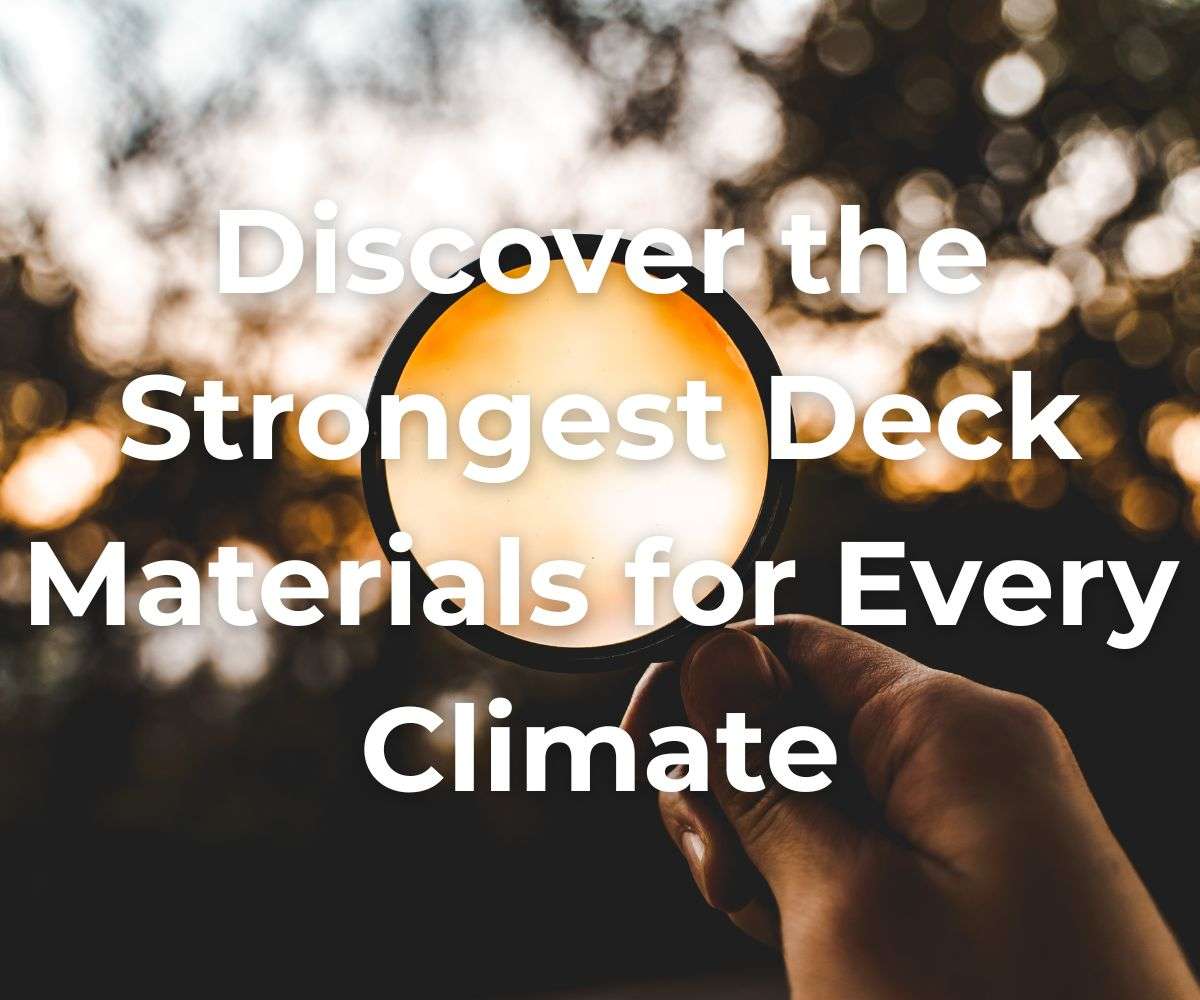discover the strongest deck materials for every climate
Description
Maximizing Durability: The Strongest Deck Materials for Every Climate
Building a deck is an investment, and choosing the right materials ensures you get a structure that withstands the test of time. Your deck must endure everything from blazing summers to freezing winters, and the right materials can make all the difference. Let's explore the most durable deck materials suited for various climates to help you make an informed choice.
Understanding Climate Challenges for Deck Materials
Different environments present unique challenges to deck longevity. Selecting materials that respond well to your local climate can prevent unnecessary maintenance, costly repairs, and premature replacement.
Hot and Sunny Climates
Regions with intense sun and heat require materials resistant to warping, fading, and cracking. UV rays can significantly damage decks, especially if they’re made from untreated wood. Similarly, extreme heat can cause some materials to expand, creating structural wear over time.
Wet and Humid Climates
Frequent rain and high humidity bring their own set of problems, like moisture absorption, rot, and mold growth. Decks in these settings should feature water-resistant materials to avoid swelling, warping, or termite infestations.
Cold and Snowy Climates
Winters with heavy snow, ice, and constant freezing temperatures demand deck materials that resist cracking and brittleness. Frost, freeze-thaw cycles, and moisture can damage less durable options.
Coastal Areas
If you live near the coast, your deck faces salt spray, high humidity, and the corrosive effects of salty air. Decks here need enhanced resistance to decay, rust, and moisture damage.
Top Deck Materials for Durability
When selecting deck materials, prioritize options that excel in strength, longevity, and climate adaptability.
Pressure-Treated Wood
Pressure-treated wood is one of the most budget-friendly options. It undergoes chemical treatment to resist insects, rot, and decay. However, while it performs decently in most climates, it requires regular maintenance, such as sealing and staining, to increase its longevity, especially in wet and humid areas.
Best used for:
- Moderately hot or cold climates
Tropical Hardwoods
Tropical hardwoods like Ipe, Cumaru, and Teak are prized for their density and natural resistance to rot, insects, and moisture. These woods typically last for decades, even in wet or coastal areas. However, their hardness makes them labor-intensive to install, and they often carry a higher price tag.
Best used for:
- Wet, humid, or coastal climates
Composites
Composite decking is a mix of wood fibers and recycled plastic. This combination results in an extremely durable material that resists fading, warping, and mold. Composite decks are low-maintenance and perform well in extreme weather conditions, making them a versatile choice.
Best used for:
- Hot, wet, or cold climates
PVC Decking
PVC (polyvinyl chloride) decking is 100% plastic, offering exceptional resistance to moisture, mold, and insects. It doesn’t need staining or sealing and is highly durable in harsh conditions. For regions with heavy rain, PVC is one of the most reliable options because it won’t absorb water.
Best used for:
- Wet, coastal, or sunny climates
Aluminum Decking
Aluminum is a highly durable material for decks, standing up to intense sun, water, and freezing temperatures without warping or rusting. It doesn’t require much maintenance, and its slip-resistant surface ensures safety in wet or icy conditions. While it can be costlier, aluminum decking lasts for decades.
Best used for:
- All climates, especially extreme cold or saltwater exposure
Factors to Consider When Choosing Deck Materials
Beyond climate, there are a few additional factors to assess when planning your deck:
- Cost: Some materials, like tropical hardwoods or aluminum, come with higher upfront costs. Balance your budget with long-term durability and maintenance expenses.
- Maintenance: Materials like pressure-treated wood require regular upkeep, while composites and PVC are virtually maintenance-free.
- Aesthetics: Each material offers a unique look, from the natural beauty of tropical hardwoods to the modern appearance of composites.
- Environmental Impact: Consider options made from sustainably sourced or recycled materials to minimize your environmental footprint.
Tips for Enhancing Durability in Any Climate
No matter the material or climate, certain practices can extend your deck's lifespan:
- Keep It Clean: Regularly clean your deck to prevent debris buildup, which can trap moisture or cause surface wear.
- Apply Sealants: Sealing wood decking protects it from water damage and UV rays.
- Provide Ventilation: Proper air circulation beneath the deck prevents moisture buildup, particularly in humid regions.
- Inspect Annually: Check for cracks, splinters, or signs of decay and address repairs immediately.
Consulting the Experts
While this guide provides a foundation for selecting durable materials, partnering with professionals ensures you get a solution tailored to your specific needs. Many deck companies in Richmond, for instance, specialize in offering customized advice based on local weather patterns and other factors.
Collaborating with experts guarantees that your deck can handle the demands of your climate while maintaining its visual appeal.
Build a Deck That Endures
Investing in durable deck materials suitable for your climate ensures a long-lasting and beautiful outdoor space. Whether you’re battling summer heat, winter snow, or coastal humidity, options like composites, aluminum, or tropical hardwoods allow you to enjoy your deck without constant worry about maintenance or repairs. Plan carefully,and maintain diligently, and your deck will serve as a reliable outdoor retreat for years to come

















.png)









Looking for reliable concrete services in Plainview, TX? Concrete Connection delivers top-quality driveway installation, sidewalks, foundations, and more. Their skilled team ensures durable results and excellent customer service every time. Highly recommended! 𝐍𝐚𝐦𝐞: Concrete Connection 𝐏𝐡𝐨𝐧𝐞 𝐧𝐮𝐦𝐛𝐞𝐫: (806) 774-5556 𝐀𝐝𝐝𝐫𝐞𝐬𝐬: 2102 25th Street, Plainview, TX 79072, USA 𝐁𝐮𝐬𝐢𝐧𝐞𝐬𝐬 𝐆𝐦𝐚𝐢𝐥: [email protected] 𝐖𝐞𝐛𝐬𝐢𝐭𝐞 𝐥𝐢𝐧𝐤: https://concreteconnectionllc.com/ 𝐆𝐁𝐏 𝐥𝐢𝐧𝐤: https://www.google.com/maps?cid=9098592654574445330